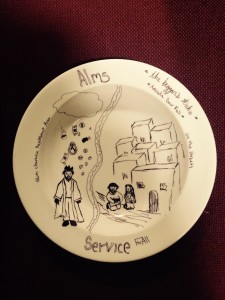The Beggar’s Strike
Is begging a trade; rather, is it a necessary part of society? This is the question that The Beggar’s Strike seeks to address, while simultaneously tackling political corruption and countering using religion for gain. The city politicians constantly complain about the way the beggars clog up the streets and discourage tourism, but when the beggar’s leave, the leaders don’t know what to do. This is because they constantly ask the marabouts for help, and the marabouts always tell them they can solve their problems by giving certain alms to beggars. Without beggars, they can’t give alms or receive the blessings and good fortune that comes from giving alms. Slowly the city men begin to realize that the beggars are indeed necessary.
My art piece is about the before and after of the beggar’s strike. Before, the beggars sat on the street, receiving meager alms and scraping by. After, they lived, as described in one scene, like princes because everyone kept visiting them and raining gifts upon them, as their services became more visibly valuable. On page 58 of the story, we can see the description of the battu-bearers before the strike, people said to “have nothing, absolutely nothing, and who would starve, were it not for their battu that they stretch out to passers-by.” Two pages later, we see where they stand now, “the beggars are living like princes…donations rain from heaven…” This stark difference points out the power of a strike, and, indeed, the importance of the beggars for the society.
